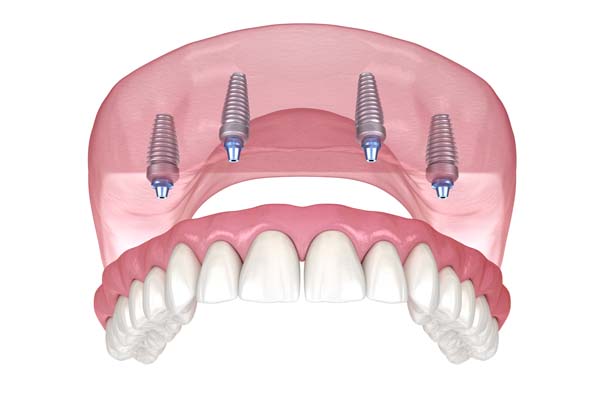Reasons to Consider All-on-4® to Replace Missing Teeth

If you are researching replacement options for missing teeth, then you will most likely come across All-on-4®. The All-on-4 treatment is a type of implant denture for replacing a complete dental arch. In this article, you will learn about the purpose of the system, how it works and what to expect.
Overview of the All-on-4 system
All-on-4 is an innovative method of replacing teeth with dental implants. One must understand what dental implants are to fully comprehend the difference between this system and other teeth replacement options. A dental implant restoration is a system where a tooth is replaced by inserting a small titanium post through the gum into the jawbone. A replacement tooth, created from acrylic, porcelain, or composite, is attached to the implant, which acts as the tooth root.
The All-on-4 system utilizes this concept of using implants to support replacement teeth with four implants that mount a complete set of upper or lower teeth. While traditional dental implants typically use one implant for each missing tooth, the All-on-4 option uses only four implants. The outcome is a minimally invasive procedure that provides the feel and function of natural teeth.
Why consider All-on-4?
Dentures and single implants are solutions for those missing some of their teeth. Essentially, the tooth replacement option that the dentist and the patient chooses depends on the nature of the damage and the number of teeth still on the jaw. If most of the teeth are severely damaged or missing, All-on-4 is an excellent choice to restore the smile and help the jaw retain structural integrity.
Quick process
With All-on-4, patients just need to have one appointment to place their dental implants. Since the whole implant fits into one framework, the dentist will not have to cut holes to accommodate separate implants. In addition, the dentist already has a general idea of where to put the implants to support the whole arch of teeth. Therefore, the All-on-4 procedure may conclude in a matter of hours.
Bone grafting may not be necessary
When getting All-on-4 dental implants, a patient may not require a bone transplant. When a patient's jawbone is insufficient or too weak to support a dental implant, a bone transplant is often necessary. With All-on-4 implants, however, a bone transplant may not be necessary since the implants may be put in places where the jawbone has adequate density.
Rapid results
One of the main advantages of All-on-4 implants is that patients may have a full set of teeth in only one procedure instead of the several operations required for other tooth replacement systems. This approach allows patients to achieve their smile goals in a single session. Since conventional dental implants might take as long as six months to finish, the All-on-4 method may be more attractive to some patients.
Easy care
These implant-supported dentures save the hassle of removing and re-inserting removable dentures whenever they need cleaning. Compared to traditional dentures, the All-on-4 system requires far less effort and time to maintain. Having a secure implant helps to maintain jaw health and promotes regular dental care. Patients can care for dental restorations just like natural teeth. Regular checkups and cleanings are still important.
The All-on-4 procedure
The process starts with a consultation appointment with the dentist. Here, the patient and the dentist will discuss the most suitable option for tooth replacement. Next, the dental professional may take X-rays of the jaw to get a better view of the gums, jaw, and teeth. After the final decision, the dentist will provide instructions on how to prepare for the procedure.
The implant placement typically lasts about two to three hours and is usually done under general anesthesia or IV sedation for maximum comfort. First, the dentist will prepare the mouth for the implants. This preparation may include the removal of existing damaged teeth or infected tissues from the gums. Afterward, they will place the titanium implants via an incision to the gums. Once the implants are in place, the incision will be stitched closed.
Patients must wait a while in the dental office for the anesthetic to wear off. Then, the dentist will provide instructions for aftercare, including diet options and oral hygiene, and schedule a follow-up appointment.
Consider the All-on-4 implant system
Although every form of surgery has its associated risks, the All-on-4 procedure is safe with minimal risks of adverse side effects. Most people who opt for the teeth replacement option are usually satisfied with the results, especially the renewed confidence when talking or chewing. If you are looking to replace your lost teeth, it is advisable to consult a dental professional to know which options would work for you.
Request an appointment here: https://cosmeticdentistdallastx.com or call Lalangas Family Dentistry at (972) 534-6008 for an appointment in our Dallas office.
Check out what others are saying about our dental services on Yelp: All-on-4 Dental Implants in Dallas, TX.
Related Posts
All-on-4® dental implants provide an innovative, natural-looking solution for patients experiencing extensive tooth loss. Unlike traditional dentures, this treatment combines the permanence and stability of implants with the efficiency of a streamlined design. A general dentist is often the first to identify candidates for this treatment, helping to coordinate care and ensure patients achieve lasting…
If you’re considering tooth restoration for your lost teeth, then you might have thought about dental implants like All-on-4®. The thing with implants, though, is that to get them done for more than a few teeth, such as with patients who have lost all their teeth, means making a considerable investment in time and money.…
All-on-4® dental implants are a full-arch restoration for missing teeth. With this option, restoring a full set of teeth only requires four dental implants. Patients who have experienced significant tooth loss in one or both arches may benefit from this procedure. You might want to learn more about the All-on-4 process and recovery if you…
If you’ve lost a lot of teeth and thought about getting dental implants, then you may have heard about All-on-4® implants. Like most things, though, you may be concerned that there are issues with side effects. After all, dental implants require oral surgery and putting prosthetics into your mouth, so it’s important to know whether…


